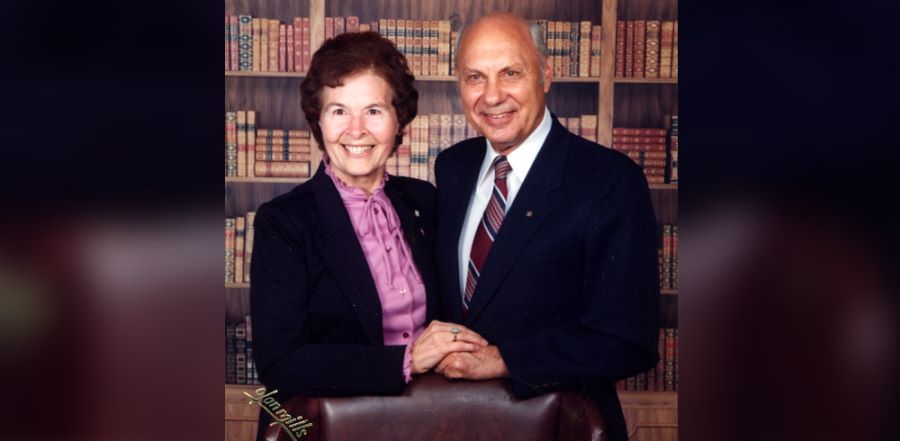Joseph R. Flower (1913-2010): The Story Behind An Assemblies of God Pioneer and Leader
This Week in AG History — August 19, 1962 By Glenn W. GohrOriginally published on AG News, 17 August 2023 Joseph Reynolds Flower (1913-2010), the oldest son of J. Roswell Flower and Alice Reynolds Flower, had a long and distinguished ministry … Continue reading

This Week in AG History — August 19, 1962
By Glenn W. Gohr
Originally published on AG News, 17 August 2023
Joseph Reynolds Flower (1913-2010), the oldest son of J. Roswell Flower and Alice Reynolds Flower, had a long and distinguished ministry in the Assemblies of God. He is remembered as a pastor, district official, and as general secretary of the Assemblies of God.
Joseph Flower was born in Indianapolis in 1913, one year before the founding of the Assemblies of God, and he often told people that he was born the same year as the start of the Christian Evangel, which later became the Pentecostal Evangel. His parents, J. Roswell and Alice Flower, were the founding editors of that publication, which was started in Plainfield, Indiana, just outside of Indianapolis.
Flower lived in St. Louis for two years and then moved to Springfield, Missouri, with his parents in 1918, where he attended elementary and junior high school. As a teenager he moved with his parents to Pennsylvania. While his father was superintendent of the Eastern District, the Flower family lived in Lititz, Pennsylvania, and Joseph attended Franklin and Marshall College for two years in nearby Lancaster.
Flower was preparing for a teaching career when he attended a camp meeting in western New York conducted by Charles S. Price. He said later, “It seems that God dealt with me in a special way at that camp meeting to go into the ministry.” In 1932 he enrolled in Central Bible Institute to prepare for the ministry. He graduated in 1934.
In the 1930s and early 1940s, Flower pastored or pioneered churches in Bethlehem, Pennsylvania; Dansville, New York; and Buffalo, New York. One of the churches he helped found is now known as The Tabernacle in Orchard Park, a suburb of Buffalo, New York.
In the summer of 1936, 16-year-old Mary Louise Paige preached a tent revival in Buffalo, and this led Gordon Bender of Riverside Assembly of God to want to start a new church in South Buffalo. He asked Joseph Flower to pioneer this work. The church was started in a small, vacant lot across the street from a tire shop.
Salvaging lumber from a barn that was being torn down, Flower and Bender built a small building, starting with a basement. The congregation was still meeting in the basement when Joseph Flower left a couple years later. That church grew and prospered over the years and is now one of the strongest churches in Buffalo.
While pastoring the church in South Buffalo, Flower agreed to have a single female evangelist hold services. That evangelist was Mary Jane Carpenter, who later became his wife. Joseph and Mary Jane (Carpenter) Flower were married on June 6, 1940, during the New York/New Jersey District Council at Maranatha Park in Green Lane, Pennsylvania.
One interesting story is that on the way to their honeymoon, the couple stopped to visit the pastor at Dover-Foxcroft, Maine, who was Charles Greenaway. He had recently lost his wife and was grief-stricken. Joseph and Mary Jane decided to invite him to come to the campground where they were going for their honeymoon, and he could have his own cabin and get away for a while.
While at the camp, the two men ended up going fishing almost all day every day. Mary Jane was feeling left out, so some friends helped her to dress up like Pocahontas and get in a canoe to see if she could get her husband’s attention. The plan worked, and the men quit fishing for the day. After their time at the camp was over, both Joseph and Mary Jane were glad they could be a blessing to Greenaway after the loss of his wife.
Joseph Flower was ordained in 1943 by the New England District Council. Together, Joseph and Mary Jane pastored in Pottstown, Pennsylvania; Dover-Foxcroft, Maine; Melrose, Massachusetts; and Syracuse, New York. From 1953 to1954 Flower was assistant district superintendent of the New York-New Jersey district, and then served as New York district superintendent from 1954 to 1975.
Joseph followed in his father’s footsteps. J. Roswell Flower was the first general secretary, elected at the Hot Springs convention in 1914 and continued in that role for much of his life. Joseph Flower in turn served as general secretary from 1975 to 1993. During his time as general secretary, not only did he keep the minutes of the General Presbytery, Executive Presbytery, and General Council meetings, but he maintained the records of credentialed ministers and churches. He also responded to questions of doctrine and practice in the Assemblies of God.
Spending hours in careful and prolonged Bible study, Joesph took detailed notes on his studies and used them in writing articles for the Pentecostal Evangel as well as in his preaching and speaking. Some of his writings include “The Charismatic Movement,” “The Christian and His Money,” “The Christian’s Attitude Toward Intoxicating Drinks,” “Does God Deny Spiritual Manifestations and Ministry Gifts to Women?” “Holiness, the Spirit’s Infilling, and Speaking with Tongues,” “Initial Evidence: Maintaining Our Pentecostal Distinctive,” “The Purpose of Prophetic Utterance,” “The Relationship Between the Pastor and the Church Board,” “A Sign or Stumbling Block?” and “Why Tongues?”
Flower also served on various administrative committees and boards, including Northeast Bible Institute, Long Island Bible Institute, Central Bible College, Evangel University, the Assemblies of God Theological Seminary, and Commission on Chaplains. J. Roswell and Alice Flower started the Homemakers Sunday School class at Central Assembly of God (Springfield, Missouri) in 1937, and after their passing, Joseph and Mary Jane Flower led this class for several years. This class still continues, being taught by a family member, David Ringer.
Devoted to ministry, Flower went to great lengths to be compassionate to others. He often quoted Philippians 1:6, “Being confident of this, that he who began a good work in you will carry it on to completion until the day of Christ Jesus.”
In looking back over his life, Joseph Flower once said, “I always felt that God was there behind the scenes controlling my destiny and being in charge of all the circumstances.”
Joseph Flower passed away in Springfield, Missouri, on March 29, 2010, at the age of 97. He and his wife are both buried in Greenlawn Memorial Gardens in Springfield.
Read Joseph Flower’s article, “Why Tongues?” on pages 5-7 of the Aug. 19, 1962, issue of the Pentecostal Evangel.
Also featured in this issue:
• “The Promise of the Father,” by Robert L. Brandt
• “Manifestations Do Profit,” by J. Robert Ashcroft
And many more!
Click here to read this issue now.
Pentecostal Evangel archived editions courtesy of the Flower Pentecostal Heritage Center.
Do you have Pentecostal historical materials that should be preserved? Please consider depositing these materials at the Flower Pentecostal Heritage Center (FPHC). The FPHC, located in the Assemblies of God national offices, is the largest Pentecostal archive in the world. We would like to preserve and make your treasures accessible to those who write the history books.
Flower Pentecostal Heritage Center
1445 North Boonville Avenue
Springfield, Missouri 65802 USA
Phone: 417.862.1447 ext. 4400
Toll Free: 877.840.5200
Email: archives@ag.org
Website: www.iFPHC.org



